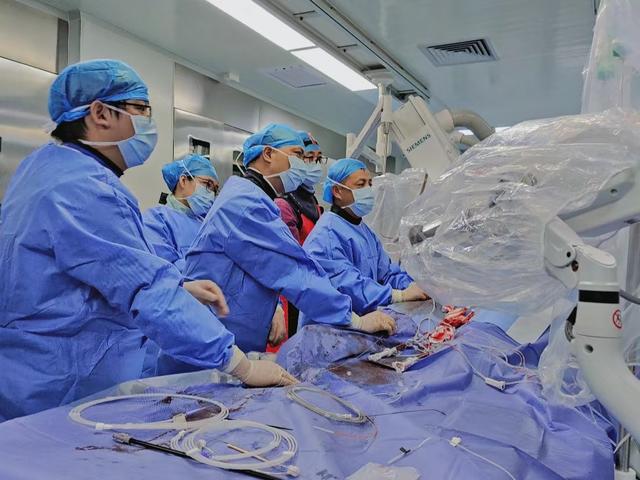Foshan: The "heart" hopes of elderly patients can change the "heart door" without opening the chest.
Author:Yangcheng Evening News Yangche Time:2022.08.03
Text, Figure/Yangcheng Evening News all -media reporter Liang Zhengjie intern Liu Xunjun correspondent Chen Lin
Recently, the Foshan Fosun Zencheng Hospital (hereinafter referred to as the "Zen doctor") cardiac team team successfully entered the minimally invasive intervention technology-TAVI replacement (TAVI) was successful as a 70-year-old aortic valve medium-severe stenosis Patients have completed the aortic valve replacement, and the patient has now recovered. The development of the operation means that the aortic valve disease with high risk of surgical surgery, high risk of surgery, and surgical taboos can bring "heart" hope.
The 70-year-old Liang Bo, 8 years ago, often experienced symptoms of chest tightness and chest pain after activity. Two months ago, the condition of the disease was obtained. Three vascular critical lesions have different degrees of critical stenosis in the first surrender, rotation, and right crowns. Simply put, it suffers from "heart valve disease".
"According to the traditional treatment plan, the treatment of aortic valve stenosis is generally adopted by incomplete closure and closure. Large and poor constitution. Traditional surgical chest opening surgery has a large trauma and high risk of surgery. According to the consensus consensus of domestic and foreign aortic valve disease diseases, TAVI surgery is currently the preferred treatment plan that can relieve Liang Bo's symptoms.

"TAVI surgery requires multi -department cooperation." Peng Yucheng said that after cardiovascular department, intervention in medical department, anesthesiology, video department, ultrasound, thoracic and intensive medical department, multidisciplinary consultation and in -depth and rigorous analysis Discussion, designed a thorough surgical plan and emergency plan.
According to reports, TAVI surgery is a heart ceiling surgery, which has complex operation and high technical difficulty. There are only a handful of hospitals that can complete this operation in Foshan. In order to ensure the smooth operation of the operation, the chief physicians Peng Yucheng, Liu Kaidong, and Han Weili cooperated to send the interventional catheter through the puncture femoral artery. The artificial heart valve was transported to the aortic valve area under the perspective of X -ray. Completion of artificial aortic valve replacement, cross -petal pressure dropped from 69mmHg before surgery to 5mmHg, and the entire surgery was only 2 hours. After the operation, the symptoms of chest tightness and chest pain with Liang Bo disappeared after many years. After discharge, Liang Bo's quality of life improved significantly compared with before admission.
What is aortic valve stenosis?
Aortic valve stenosis means that the aortic valve cannot be completely opened, resulting in a decrease in the blood flow of the aortic valve. The narrow valve is like a bad "door". It is difficult to open or open the incompleteness, and the blood through the passing has become less, which cannot meet the whole body's needs for blood. Over time, patients will experience symptoms such as heart failure, asthma, black mask, syncope, and angina pectoris, and the risk of sudden death is very high.
Tavi surgery
TAVI surgery is an interventional treatment technology, mainly through femoral arterial puncture, and then sent a special artificial valve to the position of the aortic valve through the catheter to replace the initial aortic valve with the original lesion. Compared with the traditional open -thoctoral circulation underneath the aortic valve replacement, TAVI surgery avoids risk factors such as open chest, in vitro circulation, and cardiac arrest. The replacement of arterial valve has greatly reduced the risk of surgery. TAVI surgery is suitable for the following patients: after aortic valve replacement, valve dysfunction or damage is required, and patients who need to surgery again; patients with older age, poor heart function, and unable to perform conventional valve replacement surgery.
Source | Yangcheng Evening News · Yangcheng School
Responsible editor | Zhu Jiale
- END -
Every morning, my fingers can't move. What is the disease?Doctor: This is a rheumatoid signal light

Get up in the morning and find that my fingers are stiff, and I can't even move?Th...
The medicine cost of the medical insurance city 9 months after grabbing the wrong medicine has not been retired from the parties to worry about affecting the fetus

For the first time, the Chinese medicine details that Ms. Wang was caught by Ms. W...